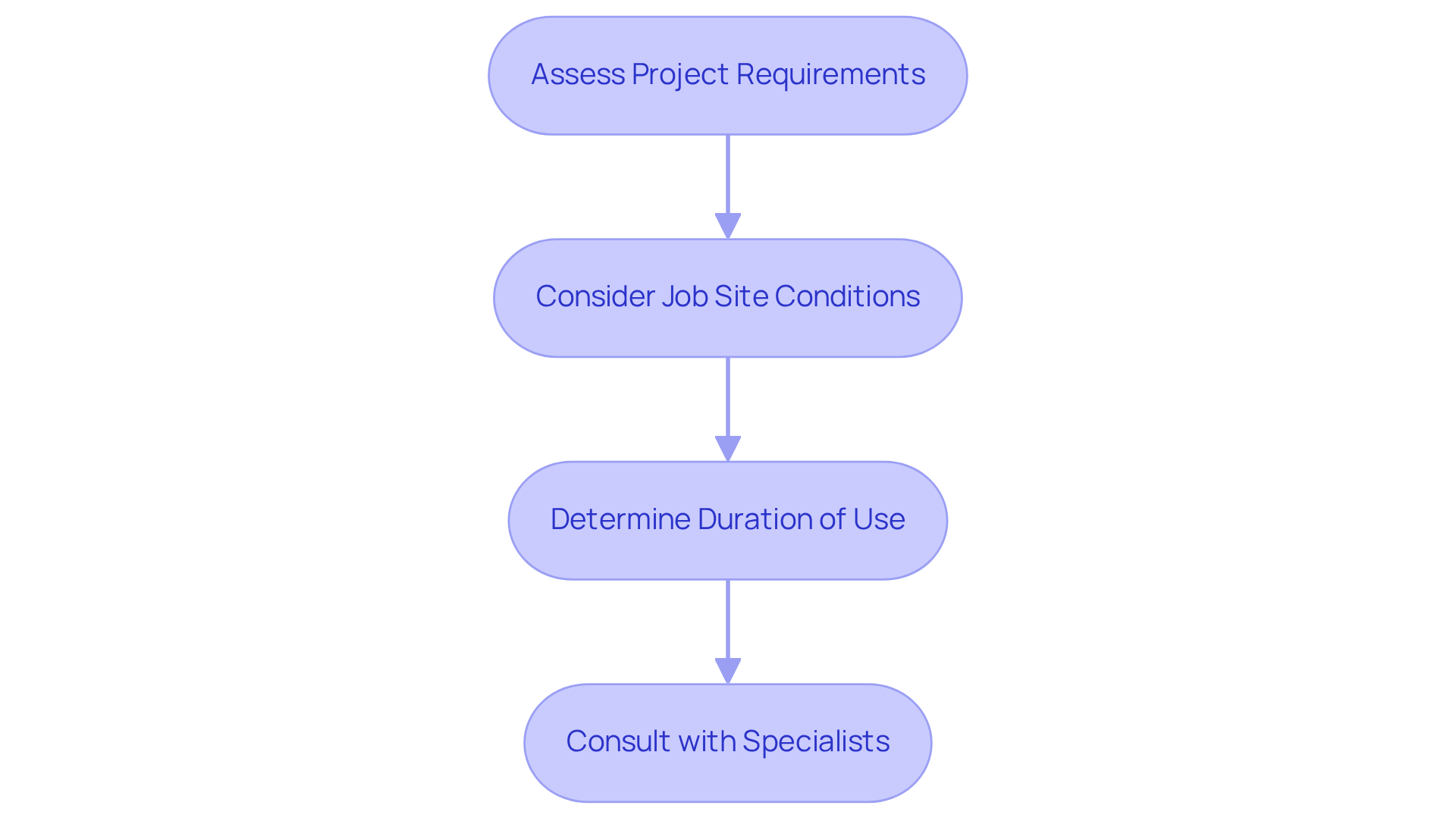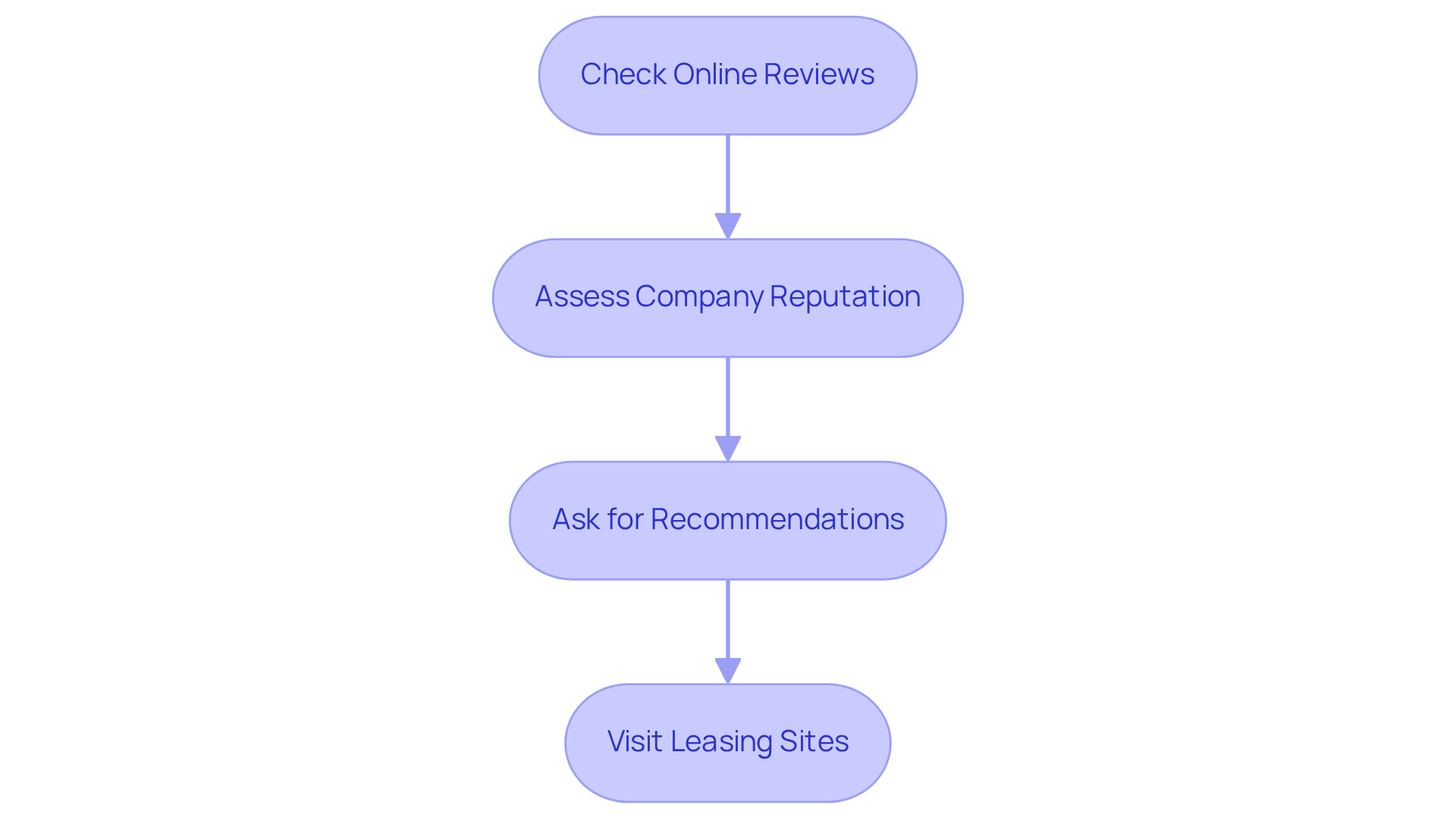Overview
The four essential steps for achieving heavy equipment rental success in Dallas are as follows:
- Assess project requirements
- Research reliable rental companies
- Compare rental terms and pricing
- Finalize the rental agreement
Each step is supported with practical advice, such as evaluating job site conditions and consulting specialists. This comprehensive approach ensures that the equipment selected aligns with project needs while minimizing potential issues throughout the rental process.
Key Highlights:
- Begin by assessing project requirements to identify necessary tools, such as excavators for excavation tasks.
- Evaluate job site conditions including space, terrain, and accessibility to choose suitable equipment.
- Determine the duration of equipment use to decide on daily, weekly, or monthly leasing options.
- Consult with leasing specialists for tailored recommendations based on project specifics and market conditions.
- Cheque online reviews to gauge customer satisfaction and company reputation in the construction sector.
- Gather personal recommendations from industry contacts to identify reliable rental companies.
- Visit leasing sites to inspect equipment and assess professionalism before making a decision.
- Request estimates from multiple firms, ensuring all potential fees are included in the quotes.
- Examine lease conditions for clarity on duration, late fees, and maintenance responsibilities.
- Evaluate flexibility in leasing terms for potential adjustments based on project needs.
- Negotiate terms and pricing with rental companies to secure favourable leasing conditions.
- Review the rental agreement thoroughly, ensuring all terms are clear and understood before signing.
- Clarify responsibilities regarding maintenance, damage, and insurance to prevent future disputes.
- Document the condition of equipment before possession to avoid disputes upon return.
- Keep a copy of the rental agreement for reference throughout the rental period.
Introduction
Navigating the world of heavy equipment rental presents a significant challenge, particularly in a bustling market like Dallas, where the demand for reliable machinery continues to rise. Selecting the right equipment is not merely a choice; it is a crucial factor that directly influences productivity and safety on job sites. Yet, many individuals encounter obstacles in identifying their specific needs, assessing rental options, and negotiating favorable terms.
What essential steps can be taken to ensure a seamless rental experience while avoiding costly pitfalls?
Understand Your Equipment Needs
- Assess Project Requirements: Begin by clearly defining the scope of your project. Identify the specific tasks at hand and determine the tools that will best support these activities. For instance, if excavation is required, consider heavy equipment rental Dallas for renting an excavator or backhoe, as these are essential for effective earth-moving. EZ Machinery Leasing provides a range of heavy equipment rental in Dallas, such as boom lifts, forklifts, and mini excavators, which play a crucial role in enhancing construction productivity and safety.
- Consider Job Site Conditions: Evaluate the dimensions and characteristics of your job site. Key factors such as space limitations, terrain type, and accessibility significantly influence the choice of suitable tools. For example, in confined areas, a compact excavator may be necessary to navigate tight spaces effectively. EZ Equipment Rental offers expert advice to assist you in selecting the appropriate tools, including options for heavy equipment rental Dallas, tailored to your specific site conditions.
- Determine Duration of Use: Estimate the length of time you will require the equipment. This evaluation is essential for determining whether to lease on a daily, weekly, or monthly basis, as it directly affects pricing and availability of resources. On average, construction machinery leases last approximately two weeks, which can greatly impact leasing expenses and decision-making regarding leasing conditions. EZ Tool Leasing's commitment to reliability ensures that you have access to heavy equipment rental in Dallas when you need it.
- Consult with Specialists: If you find yourself uncertain about your equipment requirements, reach out to leasing company representatives or industry professionals. At EZ Equipment Rental, our knowledgeable staff is dedicated to providing exceptional customer service and can offer valuable recommendations tailored to your heavy equipment rental Dallas project specifics. Incorporating expert opinions can enhance your strategy, as industry professionals can provide guidance based on current market conditions, including challenges such as supply chain disruptions and labor shortages.
Understanding these components is essential, as 84% of construction firms in the U.S. prefer leasing tools instead of purchasing, underscoring the growing reliance on leasing services to effectively meet project requirements.

Research Reliable Rental Companies
- Check Online Reviews: Start by examining customer reviews on platforms such as Yelp and Google. Focus on feedback regarding product quality, customer service, and overall satisfaction. Statistics indicate that client satisfaction scores for service leasing significantly influence business decisions, with many customers preferring companies that receive positive feedback.
- Assess Company Reputation: Conduct thorough research on leasing firms in your area, paying particular attention to their reputation within the construction sector. Companies that have established a long-standing presence and possess a proven track record tend to be more reliable. Notably, the average yearly income for machinery leasing companies in the U.S. was approximately $168,007, highlighting the competitive nature of this market.
- Ask for Recommendations: Connect with colleagues or industry contacts to gather personal recommendations. Insights from trusted sources can be invaluable in identifying reputable companies. Given that 84% of construction firms in the U.S. prefer leasing over purchasing tools, leveraging personal experiences can guide you toward trustworthy heavy equipment rental Dallas options.
- Visit Leasing Sites: Whenever possible, visit leasing sites to inspect the tools and engage with personnel. This firsthand experience provides valuable insights into their professionalism and the condition of their equipment. Importantly, the demand for high-quality tools is on the rise, driven by substantial infrastructure funding, making it essential to choose a reliable heavy equipment rental Dallas partner.

Compare Rental Terms and Pricing
- Request Estimates: To begin your equipment leasing journey, reach out to several leasing firms, including EZ Equipment Leasing in Irving, TX. Acquire quotes for the machinery you require, ensuring these quotes encompass all potential fees, such as delivery, pickup, and insurance. EZ Equipment Leasing offers a diverse range of machinery, including boom lifts, excavators, and forklifts, as part of their heavy equipment rental Dallas services, effectively serving the DFW Metroplex.
- Examine Lease Conditions: It is crucial to meticulously read the lease terms provided by each company. Pay attention to details regarding lease duration, late fees, and maintenance responsibilities. Companies like EZ Equipment Rental are known for their clear conditions regarding gear leases, ensuring a transparent leasing process that builds trust in the heavy equipment rental Dallas market.
- Consider Flexibility: Evaluate the adaptability of leasing terms. Some companies may offer options for extending the lease duration or modifying equipment should your project requirements evolve. EZ Tool Leasing stands out for accommodating such requests, simplifying the process for project managers to adapt to changing needs.
- Negotiate Terms: Do not hesitate to engage in discussions about leasing terms or pricing. Many firms, including EZ Equipment Rental, are enthusiastic about collaborating with you to secure your business, especially for heavy equipment rental in Dallas during extended lease periods. Their extensive inventory of tools, ranging from trailers to lifts, presents ample opportunities for negotiation, ensuring you get the best deal possible.
Finalize Your Rental Agreement
-
Review the Agreement Thoroughly: Before signing, it is crucial to read the entire rental agreement carefully. Ensure that all terms discussed are included, and verify that there are no hidden fees that could lead to unexpected costs later on.
-
Clarify Responsibilities: It is essential to comprehend your duties regarding maintenance, damage, and insurance. Make sure to clarify what occurs in the event of device failure or accidents, as understanding these responsibilities can prevent issues down the line.
-
Document Equipment State: Before taking possession, document the condition of the items through photos or a checklist. This practice can significantly help avoid disputes regarding damage when returning the equipment, ensuring a smooth rental experience.
-
Keep a Copy of the Agreement: After signing, retain a copy of the lease agreement for your records. This document will be invaluable for reference throughout the rental period, providing clarity and assurance as you navigate your responsibilities.

Conclusion
Navigating the heavy equipment rental landscape in Dallas demands a strategic approach to secure project success. Understanding the specific needs of a project, evaluating job site conditions, estimating rental duration, and consulting with specialists are critical steps. By doing so, clients can make informed decisions that optimize both productivity and safety.
Key insights from this guide underscore the necessity of:
- Researching reliable rental companies
- Comparing rental terms and pricing
- Finalizing agreements with clarity
Evaluating online reviews, assessing company reputations, and requesting estimates are essential in selecting the right partner for equipment leasing. Furthermore, understanding lease conditions and maintaining flexibility can lead to superior outcomes for evolving project demands.
Ultimately, renting heavy equipment should be approached with diligence and care. By following these steps, individuals and companies can not only secure the necessary tools for their projects but also cultivate a collaborative relationship with rental providers. This proactive stance in heavy equipment rental will enhance project efficiency and contribute significantly to the overall success of construction endeavors in the Dallas area.
Frequently Asked Questions
How should I begin assessing my equipment needs for a project?
Start by clearly defining the scope of your project and identifying the specific tasks at hand to determine the tools that will best support these activities.
What factors should I consider regarding job site conditions?
Evaluate the dimensions and characteristics of your job site, including space limitations, terrain type, and accessibility, as these factors significantly influence the choice of suitable tools.
How do I determine the duration of equipment use?
Estimate how long you will need the equipment, as this will help you decide whether to lease on a daily, weekly, or monthly basis, impacting pricing and availability.
What is the average duration for construction machinery leases?
On average, construction machinery leases last approximately two weeks.
How can I get expert advice on equipment selection?
If unsure about your equipment requirements, consult with leasing company representatives or industry professionals who can provide tailored recommendations based on your project specifics.
Why do many construction firms prefer leasing tools instead of purchasing?
Approximately 84% of construction firms in the U.S. prefer leasing tools, highlighting the growing reliance on leasing services to effectively meet project requirements.




